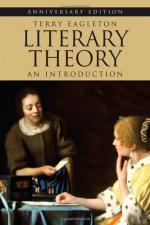
|
| Name: _________________________ | Period: ___________________ |
This quiz consists of 5 multiple choice and 5 short answer questions through Chapter 1, Rise of the English.
Multiple Choice Questions
1. How did the Romantic artist reflect her or his work in its detachment from history itself?
(a) Because she or he was seen as a major commodity who existed within society.
(b) Because she or he was seen as a minor commodity who existed on the margins of society.
(c) Because she or he was seen as a consumer of commodities who bought their goods for low pay.
(d) Because she or he was seen as a producer of commodities who sold their goods for high pay.
2. According to Viktor Shklovsky, what novel was "the most typical novel in world literature" because it impeded its own story-line so that it never gets off the ground?
(a) "Animal Farm."
(b) "History of the Rebellion."
(c) "Don Quixote."
(d) "Tristram Shandy."
3. According to Eagleton, what is ironic about those who complain of the difficulty of literary theory?
(a) "That those who complain are often civilised and educated."
(b) "That those who complain would not expect to understand a textbook of biology or chemical engineering."
(c) "That those who complain would expect to understand a textbook of biology or chemical engineering."
(d) "That those who complain are often uncivilised and uneducated."
4. What example from the late sixteenth and early seventeenth centuries does Eagleton provide that was not considered purely factual?
(a) Sermons.
(b) Decrees.
(c) News.
(d) Novels.
5. What word does Eagleton discuss that is both a descriptive term to mean "literally untrue" as well as an evaluative term to mean "visionary" or "inventive"?
(a) Idealistic.
(b) Unrealistic.
(c) Imaginative.
(d) Unimaginative.
Short Answer Questions
1. According to Eagleton, the Russian formalist shifted their attention to the "material reality" of what?
2. In the eighteenth-century, what was the whole body of writing in society considered, including philosophy, letters, history, poems, and essays?
3. Eagleton argues that the readership his book has attracted dispels the notion that literary theory is what?
4. Who was glad to abandon the "feminine vagaries of literature" in favor of penning war propaganda?
5. According to Eagleton, Gibbon and the authors of Genesis share what in common?
|
This section contains 395 words (approx. 2 pages at 300 words per page) |

|




